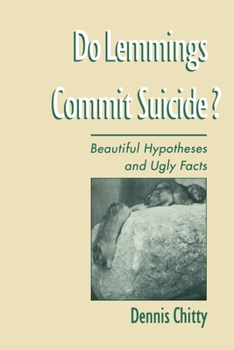Do Lemmings Commit Suicide?
Select Format
Select Condition 
Book Overview
In 1929, a group of scientists, including the author, working at the Bureau of Animal Population, Oxford University, began "the pursuit of the ecological Holy Grail", a scientific endeavor devoted to the search for the secret mechanisms behind biological life cycles as they occur in many animal populations. The results are presented here, in an account of science, not as it should be, but as it really is. Unlike nearly all science books which tell...
Format:Paperback
Language:English
ISBN:0195097866
ISBN13:9780195097863
Release Date:April 1996
Publisher:Oxford University Press
Length:288 Pages
Weight:0.90 lbs.
Dimensions:0.6" x 6.2" x 9.3"
Customer Reviews
3 ratings
Science, shown as fits and starts and roundabouts...
Published by Thriftbooks.com User , 20 years ago
Chitty's candid assessment, while not without its biases, shows the reader how science works, not linearly or dispassionately as many assume, but with different camps expending not inconsiderable passion. It also shows the amount of effort a scientist working in this field must expend (and how little control he/she has over the process being measured). Ideally, the most valid hypothesis matures into the category of scientific theory while its nestlings die. This seems not to have happened in this area--at least according to the author. In the 1950's, Dennis Chitty seems to have abandoned more supportable (and subsequently, supported) theories. Now, years later he is still looking for the grail of genetic change despite the lack of scientific support this idea seems to have. If genetic change were the mechanism behing population cycles, breeding experiments should have been able to identify the genotypes, and the genes responsible.Nevertheless, I strongly recommend this book given the view it shows of the field of rodent population ecology. I think D.E. Davis' statement in this book says it best. Looking for the causes of cycles obscures what we really need to understand, regulation.
A Grand old man of Ecology looks back
Published by Thriftbooks.com User , 21 years ago
This book, part autobiography, part critical assessment of the last fifty years in field ecology, represents a fascinating "summing up" of a lifetime career in pursuit of explanations for the abundance of animals in the wild. Chitty is remarkably candid about his own successes and failures, and one sees with clarity the attitude of a good scientist: no hypothesis, however elegant, is immune from "ugly little facts" that refute it. Along with Chitty's own work we get delightful cameo appearances (both flattering and otherwise) of many of the "greats" of mid-century ecology and evolutionary theory. Chitty makes it quite clear who he resepects and who he has difficulties with, and his commentary serves to humanize the "doing" of ecology. My only question is, how long will it take for the common sense shown in this book to penetrate contemporary text-books, many of which persist in errors that Chitty ably shows have been discarded by real practicioners often decades ago.
Excellent Book
Published by Thriftbooks.com User , 23 years ago
Interesting, with great photos and info about some of natures greatest mysteries... I love the title as well =)






